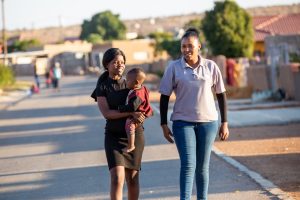World AIDS Day Reflections: Powering the Future
On World AIDS Day, m2m President and CEO Frank Beadle de Palomo reflects on the impact that two pandemics—HIV/AIDS and COVID-19—are having on adolescents and young people on the African continent. Of particular concern is the long-term impact on adolescent girls and young women, who already experienced significant social, economic, and health challenges before COVID-19.
As we commemorate World AIDS Day today, we face not one, but two, global health crises—HIV and COVID-19. The stakes of ending these pandemics and rebuilding our future could not be higher. We owe it to the younger generation, which is at continued risk of HIV infection and AIDS-related death, and is likely to suffer some of the longest-lasting consequences of COVID-19. According to UNESCO, an astounding 90% or more of the world’s student population has experienced school closures to contain the spread of COVID-19.
Adolescent girls at risk
These never-before-seen levels of disruption in education have been devastating for adolescents in the communities that mothers2mothers (m2m) serves in sub-Saharan Africa, where most young people are unable to participate in online learning because they lack Internet access. Of particular concern is the impact on adolescent girls who, before COVID-19, already experienced significant social, economic, and health challenges. For example, each week 5,500 adolescent girls and young women contract HIV globally, the majority of whom are in sub-Saharan Africa (UNAIDS). One of three girls in the region marry before their 18th birthday (World Bank). Now, deprived of vital education and support networks that are critical at this juncture in their development, the challenges they face are only exacerbated.

m2m Peer Mentor Velna Malobola
That concern is shared by Velna Malobola, who is employed as an m2m Peer Mentor in Soshanguve, South Africa, working with adolescent girls and young women: “Young people are encouraged to go to school not only to learn, but to be away from unsafe societal and community challenges. Now, by being at home, some of these young girls are in situations with no adult supervision, and they are exposed to unhealthy behaviours like sexual activities and drinking alcohol because they have nothing else to do.”
Velna says fewer girls are coming to her clinic for essential health services because they are afraid they will contract COVID-19. For those who do decide to come, it can be difficult, or more expensive, to get public transport which has been affected by the pandemic. And, when they do arrive at the facility, they may encounter long lines, or slower services as a result of screening and social distancing measures. Furthermore, widespread unemployment and food insecurity due to the pandemic have made some adolescent girls and young women more vulnerable to sexual exploitation and abuse, increasing their risk of contracting HIV.
Reaching their full potential
Velna and her fellow Peer Mentors work tirelessly to make sure adolescent girls in their communities have every opportunity to reach their full potential. When health safety precautions prevent them from traveling into the community to reach their clients, Peer Mentors stay in contact with them by phone, WhatsApp, and text messages to make sure they are accessing sexual and reproductive health services, HIV testing and treatment, and have the knowledge and support they need to make good choices for their health and future.

Velna with a client in 2019
“To be honest, we have been our clients’ source of strength because we have not stopped being there for them,” says Velna.






















